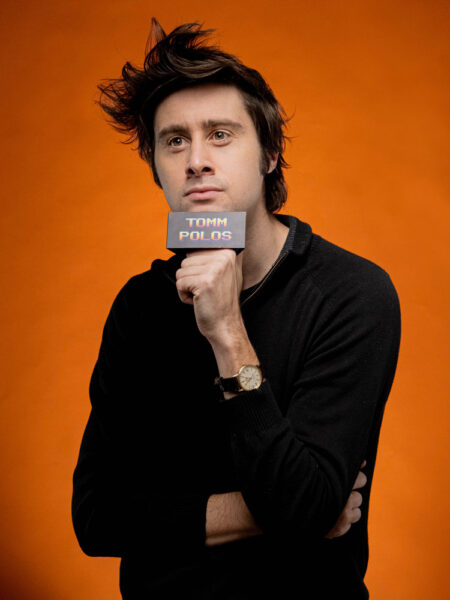
Rodric David Chair in Creator Arts and Director of Creator Arts Tomm Polos. Photo by Ev Alexander.
Tomm Polos is continuing to do what he does best: charting new waters and forging his own path. A long-time adjunct professor at the USC School of Dramatic Arts, Polos starts the academic year as the School’s first full-time appointment in Creator Arts, opening up solutions and opportunities for students on how to make a living in the modern creative economy.
“A lot of people think content and monetization are dirty words. They’re not,” Polos said. “Cave paintings were content. Ben Franklin’s Poor Richard’s Almanack was a clever monetization campaign. Everything in history is still happening today and the hyper-innovation we’re experiencing is just repurposing the power of story using different platforms and new technologies.”
As more and more creatives are using technology and the internet to carve out careers in the entertainment industry with short-form content and social media, Polos seeks to “future proof” his students—even if what that future looks like for an ever-evolving industry isn’t clear.
“Hollywood is shrinking but entertainment is expanding,” Polos said. “The apps that exist today aren’t going to exist in the same way, or at all, in five to ten years.”
Polos knows a thing or two about making a career in the new creative economy. After graduating from the USC School of Dramatic Arts, Polos set about making a living in a way increasingly common for younger artists: leveraging his personality, the internet and a variety of platforms to build a career as a creator, spokesman and public personality.
“Everyone in the creator space can benefit from an entrepreneurial mindset. My goal has always been to be Tomm for a living,” Polos said. “I didn’t always know what that looked like.”
He is best known as longtime spokesperson for AT&T, and over his career has emceed on red carpets and at world-class stadiums interviewing NFL players, Olympians, Grammy-winning artists and Hollywood actors. Through the consulting firm K.B.Z.N., he has also helped countless organizations and content creators on TikTok and YouTube gain followings and do what he does best: be themselves for a living.
He’s also a longtime Trojan—in fact, he used to be Tommy Trojan. Going through the same top-tier training program as many of his students gives Professor Polos a leg up when it comes to relating to students and helping them reach their goals. “I value mentorship and I’ve been fortunate to have benefited from mentorship. I love the fact that, as a working professional, I get to connect people to the entertainment industry and the content world,” he said.

A rational plan with irrational confidence
While training students in how to make a living using technologies that may not even have been invented yet is a daunting task, Polos reminds his students that the fundamentals of storytelling have never changed, even as the mediums for doing so go through radical advances.
“The big key to having success in creative entrepreneurship is to have a rational plan with irrational confidence,” he said. “We want [our students] to be so prepared, so used to doing, so used to accomplishing things, that when it comes time to fly, they soar.”
As a practical method for accomplishing this, Polos focuses on making things, working on tangible projects and accomplishing tasks, so that no matter how unfamiliar the platform might be, the process for understanding it and creating content suitable for it is something his students will have experienced before.
“A majority of this course is Figure It Out 101,” he said. “We assign them something to do, something to complete. So when they go to fail the next time, they realize that they’ve done it before.”
Polos especially loves connecting with young people about creative entrepreneurship because it’s an environment they grew up surrounded by. Many students at the School of Dramatic Arts have grown up idolizing content creators on YouTube and Instagram as much as traditional Hollywood actors and artists, and they are already discovering ways to make a living through creative expression on these platforms.
“They’re already enthusiastic and capable. What I admire about our student population is that they recognize that these opportunities are out there,” he said. “There’s no reason college artists can’t be entrepreneurs the way that college athletes are entrepreneurs.”
For now, Polos encourages his students to keep making things, being their authentic selves and developing resilience.
“If you want to be in the entertainment industry, you need to replace rejection with redirection,” he said. “It’s essential to remember the entertainment part of the entertainment industry—remember to have fun and work from the joy that brought you here. You have to cultivate a forward-thinking mindset to be able to take advantage of the technology when it’s there. It’s the next frontier of storytelling.”